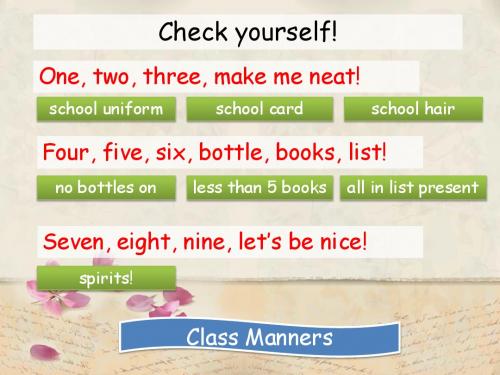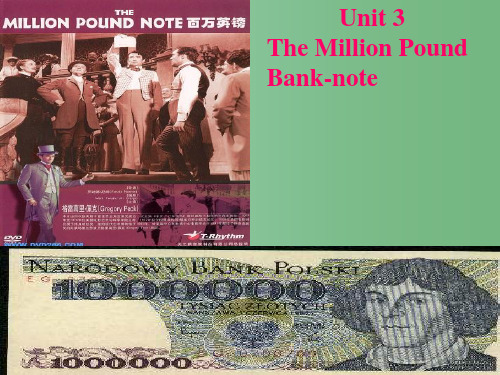人教版高中英语必修三Unit 3 The Million Pound Bank Note 教案新部编本
- 格式:doc
- 大小:119.50 KB
- 文档页数:7


单元主题:人教版必修三Unit3 The Million Pound Bank Note一、单元概述:在下面空格处简要介绍这个单元,清晰简洁地介绍这个单元的主要教学内容、教学过程和学习活动。
本单元选自必修三第三单元The Million Pound Bank Note,主要内容是根据马克吐温的短篇小说《百万英镑》改变的戏剧剧本。
透过对这一戏剧有关信息的收集和整理,提高学生的信息素养,了解马克吐温的生平和作品风格,引发学生的批判性思维,提高学生文学修养和欣赏水平,探讨金钱和人性的关系,树立正确的价值观和人生观。
在英文短剧表演中,锻炼学生交流和合作的能力,同时考察学生在原作品的基础上的创新能力。
在本单元的教学过程中,先把学生分成8人学习小组进行学习。
具体步骤如下:第一步:组织学生利用因特网等多种信息资源,完成信息收集和整理,包括作者生平、主要作品以及写作风格、《百万英镑》故事情节、以及戏剧的特点等有关信息,小组讨论交流,形成初步观点。
通过班级讨论,教师使用思维导图,补充完善信息。
第二步:组织学生观看电影《百万英镑》中,本单元内容所涉及到的片段,观看之前布置学习任务,如找出每一场中的戏剧冲突、用批判性的思维思考戏剧背后的社会现象,回答与课文相关的简单问题等。
第三步:成果展示。
利用所掌握内容,可以采用读后感的形式进行展板展示,也可以小组活动,进行英文短剧表演,可以进行适当的创新改编,要求尽量使用本单元新词汇,注意戏剧语言和动作的使用。
二、21世纪技能这个单元将重点培养哪种或哪些21世纪技能:信息素养交流和合作批判性思维创造力和创新三、课程标准与教学目标(模块4第1节后完成)请明确单元的课程标准(课程标准要来自于现行课标)和教学目标。
教学目标应与课程标准相联系,并体现21世纪技能。
课程标准语言技能目标(七级)听:1.能识别语段中的重要信息并进行简单推断;2.能听懂正常语速听力材料中对人和物的描写、情节发展及结果。



人教版高中英语必修三(Book 3 Unit 3)Unit 3 The Million Pound Bank Note核心单词1. scene n. 现场;情景;景色;发生地点;(戏剧)一场behind the scenes 在后台;在幕后on the scene 在现场;当场appear/come on the scene 出场;登场Our reporter was the first person on the scene.我们的记者是最先到达出事地点的。
I saw the scene with my own eyes.我亲眼目睹了那一幕。
The rocking boats along the river bank make a beautiful scene. 河边晃晃悠悠的船只构成了一道美丽的风景。
易混辨析scene/scenery/sight/viewscene指某一处的自然风光;情形,情景。
scenery(总称)自然景物,天然风光,是由多个scenes构成的自然风景。
sight景象,风景,名胜,侧重指值得看的事物或很难看的东西;很可笑的事物。
view景色,风景,侧重指从人所处的角度用肉眼所看到的景色。
【活学活用】(1)A new chapter in a novel is something like a new scene in a play. 一部小说中新的一章就像一出戏中新的一场。
(2)Tears poured forth as she watched the sad scene.她一看到这悲惨的场景,便禁不住流下泪来。
(3)It is the first time that I have seen such a beautiful scene.这是我第一次看到这样美丽的景色。
(4)The hall was full of fans before the star _______________. 在这个明星出场之前,大厅里挤满了他的支持者。

必修三 Unit 3 The Million Pound Bank Note——-Writing一.教材分析:1.教材所处的地位和作用:本教学案例是人教版《普通高中课程标准实验教科书·英语(必修)3》第三单元The Million Pound Bank Note第三课时U sing languag e部分。
本单元的主要内容是根据马克•吐温的短篇小说《百万英镑》改编的戏剧剧本。
其中“趣味阅读”(Reading for Fun)部分独具特色,这里列举的马克•吐温的名言都充分体现了这位伟大作家的诙谐幽默。
本课选取《夏娃日记》中的一句名言,贴近学生生活实际,有助于学生树立正确的人生观和价值观。
此外,本课的设计与2014年英语全国高考福建卷、山东卷、湖北卷、重庆卷的书面表达接轨,以谚语或名言为载体,要求学生结合自身经历论述自己的理解感悟,旨在让学生明确高考来源于教材而高于教材,进而更加重视课本知识的学习和积累。
2.教育教学目标:(1) 知识目标:学生能理解背诵马克•吐温的名言:How little a thing can makeus happy when we feel that we have earned it!(2) 能力目标:学生能结合自身经历写一篇短文论述自己对该名言的理解。
(3) 情感目标:学生能学会通过自己的努力实现自己的目标,体验生活中的点滴幸福。
3.教学重点、难点:(1) 重点:理解背诵马克·吐温的名言:How little a thing can make us happy when we feel that we have earned it!(2) 难点:学生结合自身经历阐述对该名言的理解和感悟,完成相关书面表达。
二.教法和学法1. 教法(1) 目标教学法 (2)任务教学法 (3)启发式教学法2. 学法(1)自主学习 (2) 合作探究 (3)头脑风暴 (4) 限时写作三.学情分析高一学生对英美文学著作知之甚少,对文化类阅读文章的欣赏力和深度挖掘文章内涵的能力还有所欠缺,对外国作家作品名言也缺乏自己独特地深刻地理解。
话题导入Mark Twain left school when he was twelve.He had little school education.In spite of this,he became the most famous writer of his time.He made millions of dollars by writing.His real name was Samuel Langhorne Clemens,but he is better known all over the world as Mark Twain,his penname. Mark Twain was born in 1835 and he was not a healthy baby.In fact,he was not expected to live through the first winter.But with his mother’s care,he .As a boy,he caused much trouble for his parents.He used to play jokes on all his friends and neighbors.He didn’t like to go to school,and he often ran away from home.He always went in the direction of the nearby Mississippi(密西西比河).He was nearly drowned nine times.After his father’s death,Mark Twain began to work for a printer,who only provided him with food and clothing.Then,he worked as a printer,a river-boat pilot and later joined the army.But shortly after that he became a miner.During this period,he started to write short stories.Afterwards he became a full-time writer.In 1870,Mark Twain got married.In the years that followed he wrote many books including Tom Sa w yer in 1876,and Huckleberry Finn in 1884,which made him famous,and brought him great fortune.Unfortunately,Mark Twain got into debts in bad investments(投资) and he had to write large numbers of stories to pay these debts.In 1904,his wife died,and then three of his children passed away.At the age of 70,his hair was completely white.He bought many white suits and neckties.He wore nothing but white from head to foot until his death on April 21,1910.根据上文完成下列各题1.Fill in the blank in Paragraph 2 with proper words.(no more than 4 words)managed to survive2.What does the word “who” (Line 2,Paragraph 3) probably refer to?(no more than 2 words) The printer.3.What’s the main idea of the passage?The brief introduction of Mark Twain.Period One Warming Up & ReadingⅠ.单词1.v.wander漫步;漫游permit允许;准许stare凝视spot发现;认出seek寻找;探索2.n.birthplace出生地adventure奇遇;冒险phrase词组author作家scene场景;场面pavement人行道fault过错;缺点passage船费;通道embassy大使馆patience耐性;忍耐envelop信封3.adj.contrary相反的unpaid未付款的novel新奇的;异常的Ⅱ.短语1.抚养;培养bring up2.打赌make a bet3.前进go ahead4.偶然by accident5.盯着看stare at6.导致;做出解释account for7.与此相反;正相反on the contrary1.It is Henry Adams,an American businessman,who is lost in London and does not know what he should do.他叫亨利·亚当斯,一个美国商人,在伦敦迷了路,不知道该怎么办。
人教版高中英语必修三知识点梳理重点题型(常考知识点)巩固练习Unit 3 The Million Pound Bank Note 语言点目标认知重点词汇scene,doubt,matter,issue,regret,bet,permit,fault,spot,patience,order,amount,pay,simply,manner,anyway重点短语bring up,be set in,as a matter of fact/ by accident,account for,on the contrary,take a chance,as for重点句型… when…--ever的用法知识讲解重点词汇【The million Pound Bank Note不止是百万英镑403622 词汇精讲】scene【点拨】scene n.现场, 场面,景色,(戏剧)一场①Firefighters were on the scene immediately. 消防队员立刻到了现场。
②The rocking boats along the river bank make a beautiful scene.沿河岸摇晃着的船只成为一道美丽的风景。
③The boy led his mother to the scene of the accident. (the scene of the crime)男孩儿领妈妈到了事故现场。
(犯罪现场)④The scene in the hospital is very moving. 医院的场面很感人。
⑤The last scene of the play was very impressive. 那部戏的最后一场给人深刻的印象。
相关短语behind the scenes 在后台, 在幕后, 暗中on the scene 在/到现场come on the scene 登场辨析scene/scenery/view/sight①scenery 是总称, 指大范围的自然风光,是由多个scene构成的景色, 常译为“景色”, “风景”。
教师学科教案[ 20 – 20 学年度第__学期]任教学科:_____________任教年级:_____________任教老师:_____________xx市实验学校Unit 3 The Million Pound Bank Note随堂练习1、For each statement, write“F”if it is a fact, write“O”if it is an opinion.1 F Henry wants to find a job in London.2 F Henry is given an envelope by the two brothers.3 O Henry is an unlucky young man.4 O Henry is not a proud man.5 O Henry is foolish to go and meet the two brothers.2、Find an adjective in the list to complete each sentence. Each word is used onlyonce.foolish jealous clever glad confident1 Both brothers probably felt that Henry was a clever young man.2 Henry was not confident about what would happen to him when he left the brothers.3 Henry must have felt foolish when he saw how far he had travelled out to sea.4 Henry was not glad to accept from the brothers.5 Henry felt jealous when he saw the food on the brothers’ table.课堂笔记1、A rich person gives you a large amount of money to use as you like. What willyou do with it?一个有钱人给了你一大笔钱让你随意花,你会拿它做些什么?do with对待;处理;处置(与what连用)deal with对待;处理;与……交易(与how连用)①The new teacher didn’t know what to do with the class.=The new teacher didn’t k now how to deal with the class.那位新老师不知道如何对付他班上的学生。
②I don’t know what(I should)to do with the waste paper.=I don’t know how(I should)to deal with the waste paper.我不知道如何处理这些废纸。
2、Have you ever made a bet with a friend? If so, what did you bet on?你和朋友打过赌吗?如果打过,赌的是什么?make a bet on=bet onbet-bet-bet or bet-betted-betted-betting①They made a 5-dollar bet on who would win the game.=They bet 5 dollars on who would win the game.他们押了5元赌金赌谁会在比赛中获胜。
②win/lose a bet赌赢(输)了相关链接make a choice=choose make a fool of sb=fool sbmake a decision=decided make a reply to sb=reply to sbmake an apology to sb for sth=apologise to sb for sth3、Now ladies and gentleman, you’re about to hear the most incredible tale.女士们,先生们,你们将要听到一个最令人难以置信的故事。
sb was/were(just)about to do ... when ...某人正要干……这时……=sb was/were on the point of doing ... when ...We were(just)about to start when it began to rain.=We were on the point of starting when it began to rain.我们正要出发,这时下起雨来了。
相关链接sb was/were doing ... when ...某人正在干……这时……sb had just done ... when ...某人刚刚干了……这时……I had just lain down when the telephone rang.我刚刚躺下,这时电话铃响了。
4、He is lost in London.他在伦敦迷路了。
“迷路”的三种表达方法他们在森林里迷路了。
①They were lost in the forest.②They lost themselves in the forest.③They lost their way in the forest.5、Permit me to lead the way, sir.先生,请让我来带路吧。
注意permit sb to do sth=permit doing sthallow sb to do sth=allow doing sthadvise sb to do sth=advise doing sthforbid(禁止)sb to do sth=forbid doing sth①We don’t allow anybody to smoke in our room.=We don’t allow smoking in our room.我们不允许任何人在我们房间抽烟。
②He advised us to do more reading in our spare time.=He advised doing more reading in our spare time.他建议我们业余时间多读书。
6、As a matter of fact, I landed in Britain by accident.事实上,我在英国上岸是偶然的。
as a matter of fact=in fact=in effect=in practice事实上by accident=by chance=accidentally偶然地In fact, I met him in the street by chance.=As a matter of fact, I came across him in the street.=In effect, I happened to meet him in the street.我在街上碰巧遇见了他。
7、Well, to be honest, I have none.哦,老实说,我一分钱都没有了。
to be honest=to tell you the truth老实说;说实话none一个(件)也没有(指人或物,可与of连用)no one一个也没有(只能指人,不能与of连用)①To be honest, no one was on the playground.=To tell you the truth, there was none on the playground.实话实说,操场上一个人也没有。
②To honest, none of the desks is new.(此处不能用no one)说实话,没有一张桌子是新的。
语法:宾语从句和表语从句(Noun clause as the object and predicative)宾语从句的特点是注意四个字:语序,时态;宾语从句常位于及物动词、介词或少数形容词之后。
①I don’t know how old he is.(动词之后,语序变化)我不知道他多大了。
②I was interested in what he said.(介词之后,时态变化)我对他说的很感兴趣。
③I’m sure(that)you will succeed.我确信你会成功。
形容词后接宾语从句常见的有:I’m afraid ...;I’m glad ...和I’m sure ...等句型。
表语从句位于系动词之后,常见的系动词有be,look,seem等,表语从句的语序也是陈述句语序。
①The question is where she works.问题是她在哪工作。
②It looks as if it is going to rain.看起来要下雨了。
练习1、Can you find a line in the play that uses a noun clause as the object? Writeit here.Well, why don’t you explain what this is about?May we ask what you are doing in this country?2、Make sentences with the noun clause as the object. Use one of the followingwords to complete the sentences.how who that why whether1 I don’t know who will help Henry to win the bet.2 I can’t yet tell you whether I like this play or not.3 I can’t describe how I feel if someone gave me a million yuan.4 I know that Henry must be worried about what will happen to him.5 The brothers won’t say why they decided to make a bet.3、Can you find a line in the play in which a noun clause is used as thepredicative? Write it here.That’s why we’ve given you the letter.4、Make as many sentences as possible.1 Henry’s question is why the brothers wanted to make the bet.2 The problem is that he doesn’t know anybody in London.3 Henry’ concert is how he can get food and clothing.4 His trouble is that he doesn’t know anybody in London.5 That is why the brothers wanted to make the bet.6 The brothers’ doubt is whether Henry can stay out of jail.7 Henry’ concert is where he can get a job.8 Henry’s question is what gave the two brothers the interesting idea.5、Complete these sentences with noun clauses as in the play.1 The trouble was that Henry Adams was lost in London and he had no money.2 Henry’s question was whether he could borrow some money.3 It seemed as if the brothers were playing a joke on Henry.4 The brothers’ problem was who would be the best person to test this bet.5 This is why they lent him the money.重点词汇1、account认为;说明account for导致;做出解释(account vi.)on account of=because of因为(account n.)①I account him lucky.=I account him a lucky man.我认为他很幸运。